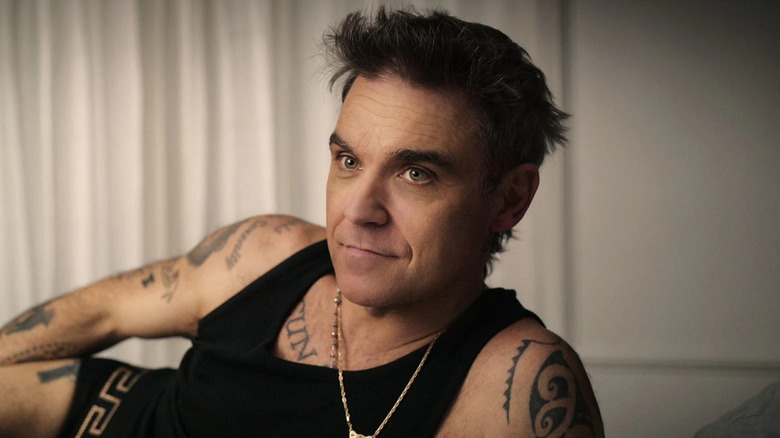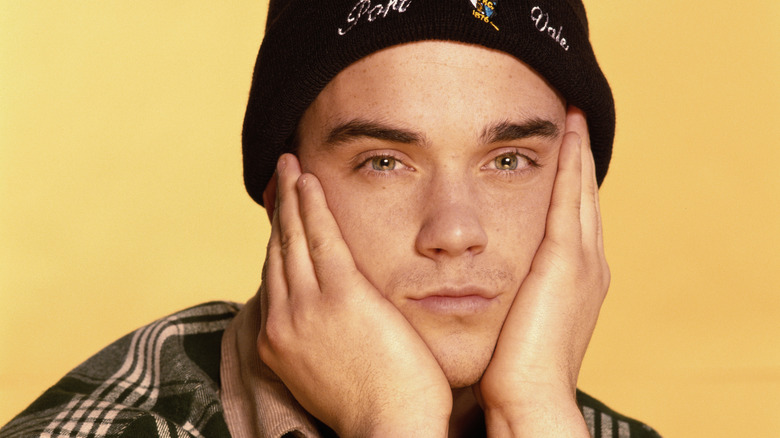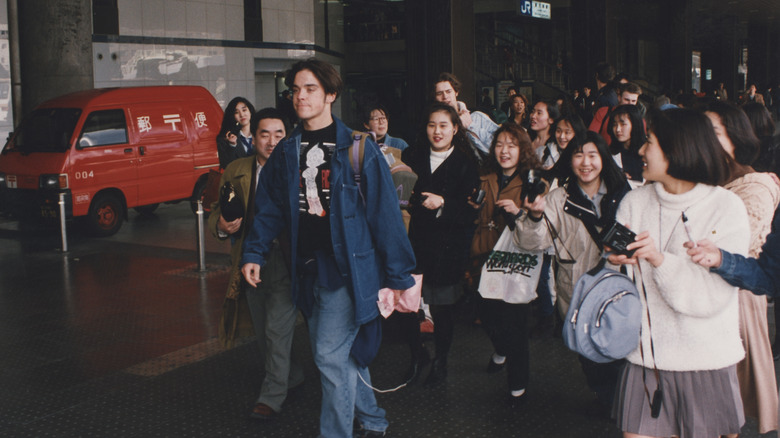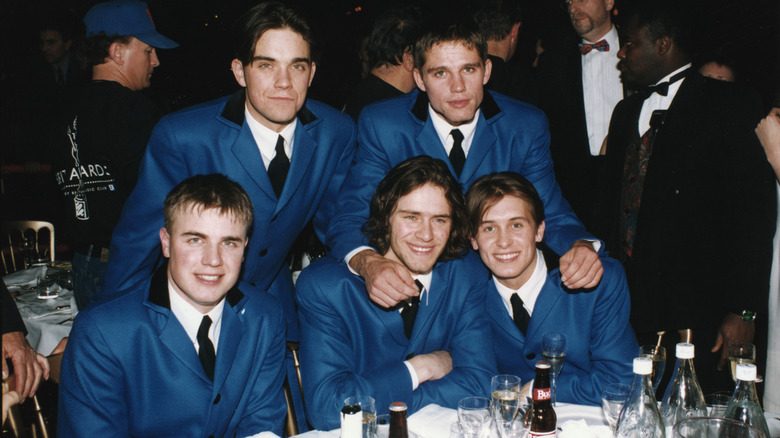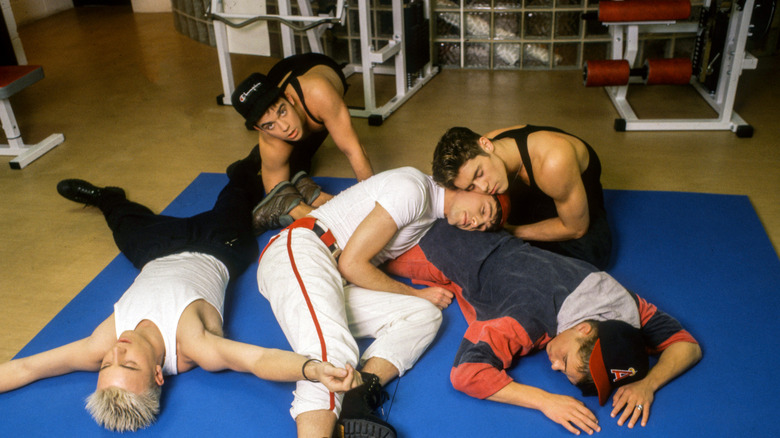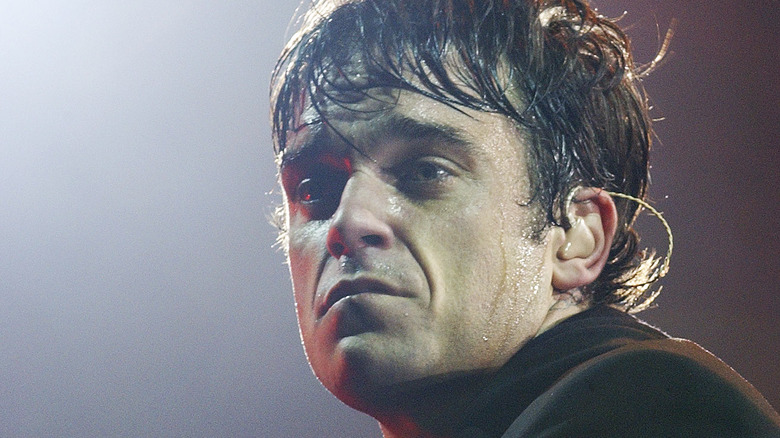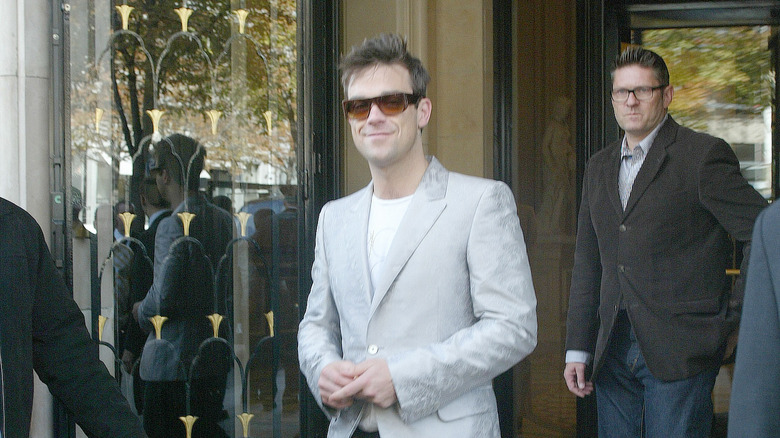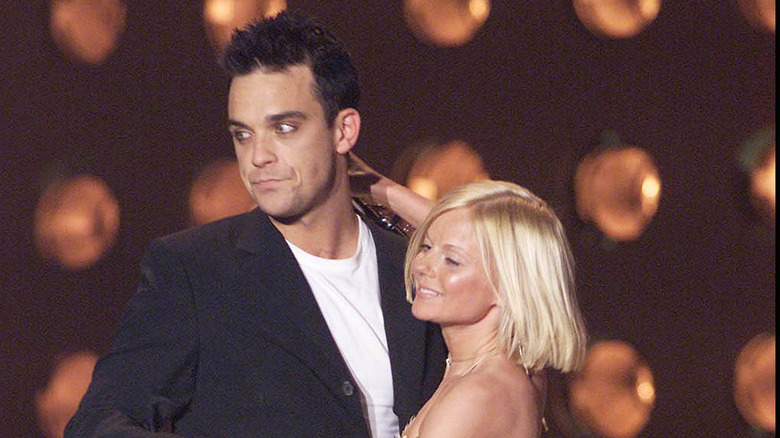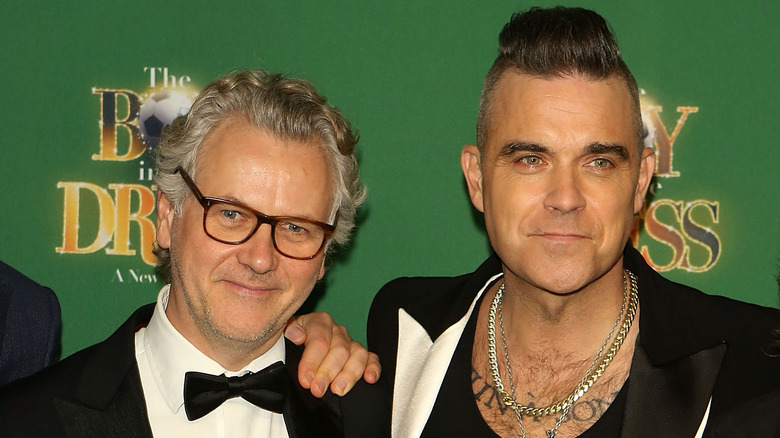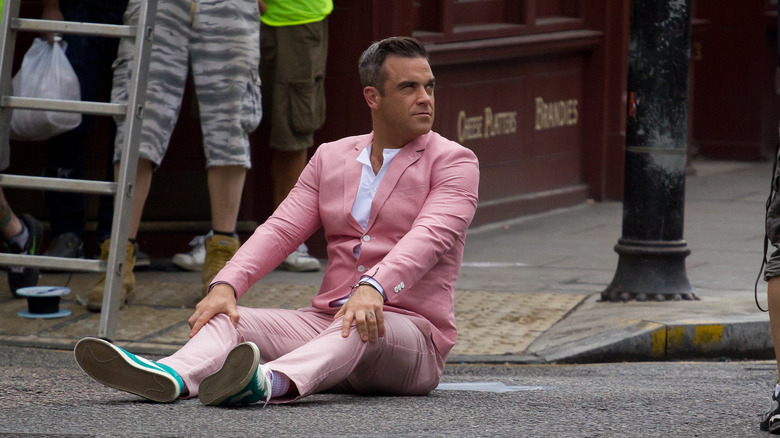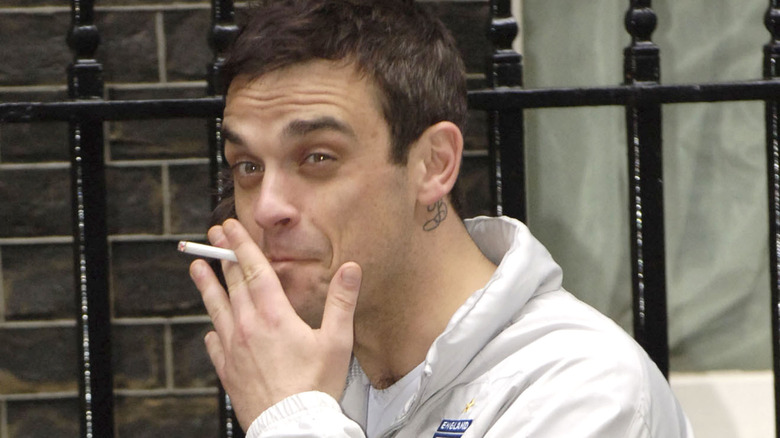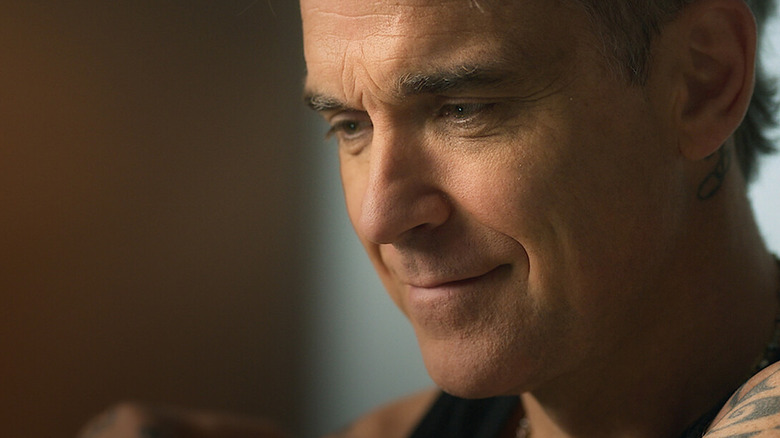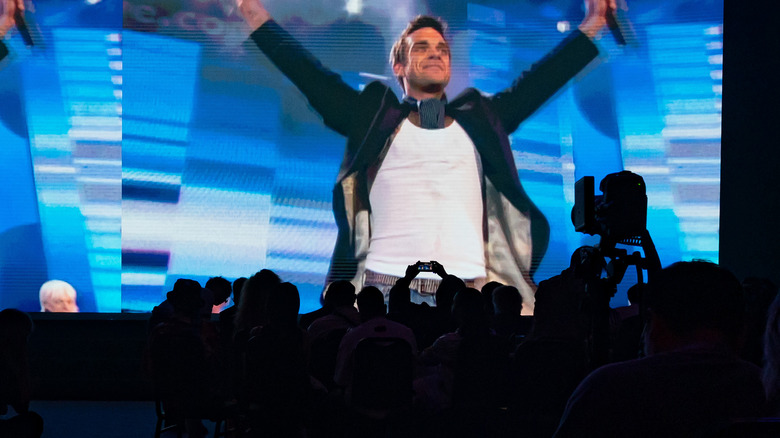Tragic Details About Robbie Williams
Even with the rise of social media and Andy Warhol's prescient prediction about the nature of fame in the future, the vast majority of the world's people will never experience what it's like to be a celebrity. And even among the fraction of a percentage of those who do, whether their star shines for decades or burns out fast, their ascent to and descent from stardom can often be charted with a single peak. Robbie Williams is an exception. The British pop singer and songwriter has been riding the waves of fame since he was 16 years old, and the journey has been choppy, to say the least.
Williams has had as many personal and professional comebacks as he's had hits, which is really saying something. While the highs have lifted him to international name recognition, acclaim, awards, and record-breaking ticket sales, the lows have nearly pulled him under on multiple occasions throughout his career. His love-hate relationship with celebrity and his vulnerability about issues such as addiction and mental illness have made him a living, breathing, crooning case study about the effects of lifelong fame. That's something Williams himself has explored in a 2017 memoir titled "Reveal," and it's also the focus of a new Netflix docuseries simply called "Robbie Williams." These are difficult truths about the rawly honest pop star that such self-exploration has brought to the surface.
His problems started before he found fame
Being plucked from obscurity and thrust onto the world stage would have a profound effect on anybody, but Robbie Williams was a particularly poor candidate for engineered stardom when he was chosen to be part of the boy band Take That in 1990. Casting agent and aspiring manager Nigel Martin-Smith had endeavored to create a British version of the American pop group New Kids on the Block. A nationwide search for young, handsome, male talent followed, and Williams' mother answered the call on his behalf, he explained in 2005's "Take That: For the Record."
Two auditions later, thanks to a well-timed wink in Martin-Smith's direction and some well-executed hip-hop dance moves, Williams received word that he'd made the final cut. It was the opportunity of a lifetime for the artistically gifted teenager. However, it also enabled a 16-year-old Williams to continue down a self-destructive path. In his memoir, Williams remembered how found out about his admission into the group on the same day he found out he'd failed all but one of his school exams. His best grade was a D on an English test. Williams also admitted in the 2005 documentary "Take That: For the Record" that he'd already been taking acid and speed and smoking weed when he was cast. He believes his drug use would've continued with or without Take That, but the lack of stability and accountability that came with leaving school and being enabled as a celebrity likely exacerbated Williams' pre-existing issues.
The spotlight left him psychologically damaged
Just as Robbie Williams would've been prone to substance abuse with or without Take That, he would've been prone to mental illness regardless of the spotlight, too. Still, the unique and often bizarre experiences that come with pop stardom put enormous extra strains on his mental health. In the "Take That" documentary, Williams explained how participation in Take That began with exhausting boot camp-like sessions and escalated into a grueling international travel schedule and press frenzy that rivaled the phenomenon that was The Beatles. At first, the attention was exciting and flattering, but eventually, the band members numbed to all the screaming ... that is, whenever they weren't in physical danger. It became part of the job for Williams to escape manic hoards of fans who, at times, attempted to sexually harass and assault band members.
Williams' longtime biographer Chris Heath described the lasting impact of the pressure and surreality on the pop star's personality in "Reveal." "He really is like a fifteen-year-old boy," he wrote. "He's just frozen in Take That time." The singer also recognized that the way he was commodified at such a young age has left him in a state of problematic permanent adolescence. In his memoir, Williams referred to himself and his fellow bandmates as "psychologically damaged" and in the Netflix doc, he posited that, "nobody graduates from childhood fame well-balanced."
Drugs and alcohol only made things worse
The idea of the hard-partying rock star or pop star is practically a cliché, but to the individuals who struggle with addiction, it's a very real nightmare. The world has lost too many musical geniuses to overdoses, and Robbie Williams is at least fortunate that he isn't one of those statistics. Drug and alcohol abuse did, however, nearly cost Williams his career and his life.
As Take That was climbing the charts and selling out stadiums, Williams' became increasingly reliant on substances to cope. The other members drank, smoked marijuana, and occasionally used harder drugs, but Williams' behavior was more extreme. He regularly drank a whole bottle of vodka at a time just to feel normal, as well as mixing alcohol with cocaine and ecstasy. At first, the rest of the band was unaware of the extent of the problem, but in time, Williams' heavy substance abuse caused conflict within Take That ... conflict that would eventually lead to the band's break up.
Williams himself has spoken out often and at length about this period of his life. In "Reveal," he explains how the apathy that comes from such reckless drug and alcohol use is like writing a suicide note to yourself. When watching footage of his wild past in the Netflix documentary, Williams said, "We are looking at somebody in freefall." The then 19-year-old was stuck in a worsening cycle of being high and drunk then hungover without any support system or the ability to help himself.
His manager and bandmates weren't there for him
Take That always would've had an expiration date, as all gimmicky boy bands do. And Robbie Williams likely would've struggled with his personal issues no matter what. But the way Nigel Martin-Smith managed his pet project pop group and the way the other members responded to Williams directly contributed to Take That's first time calling it quits and to Williams' first public downfall.
At just 16, Williams was a boy among men. Gary Barlow, Jason Orange, Mark Owen, and Howard Donald were all 18 or older when Take That formed; they bonded with each other, leaving Williams feeling isolated. He was also pitted against his bandmates from the beginning. Williams was chosen to add charisma, which the more established lead singer-songwriter Barlow lacked in Martin-Smith's estimation. As Take That got bigger and bigger, Barlow and Williams became the stand-outs, which made the already unfriendly competition between them worse. An on-again-off-again feud between the two persisted for years.
When Williams was at his lowest point, the rest of the band knew he needed help but botched his intervention. In "Take That: For the Record," the other members discussed how they went about it poorly when they ganged up on Williams about his addictions, behaviors, and the idea of continuing the tour without him. As for the manager who discovered him, Williams doesn't have much good to say about him and calls him "one of the top three most disturbed individuals" he's ever worked with. "I only wanted him to love me," Williams said. "That's the really sad thing. ... But he never did."
He couldn't enjoy his solo success
Just like any other performer who dreams of making it, Robbie Williams wanted to be successful and famous. When he went solo after about six years with Take That, he intended to achieve success and fame on an even greater scale than he'd had with the band that had made him a household name, which was a tall order. After a rocky start (there were legal obstacles to his leaving Take That and his album "Life Thru a Lens" debuted to slow sales), his second act did eclipse his first. But his luck began to feel more like a curse.
Williams collaborated with songwriter and musician Guy Chambers, who quickly became a fast friend. The fruits of their labor produced Williams' massive hit single "Angels," which, again, changed the trajectory of the pop star's life. In his memoir and in his self-titled documentary, Williams describes the paradox of superstardom. Singing and dancing to adoring sold-out crowds was the goal, and it came naturally to him to some extent. But it also left Williams, who'd already been diagnosed with depression, with crippling stage anxiety. "There's eighty thousand of them. There's one of you," he said in his book. In his documentary, he equated the experience to being on the 100th floor of a building that's on fire, adding, "The room's burning and you either stay in the room or burn to death or you jump out of the window to your death. It's that uncomfortable." Compounding the stress was the fear that nobody believed his mental health struggles were real, given that he led what appeared to be a charmed life.
He's deeply lonely
Robbie Williams had felt like an outcast as a member of Take That. He felt alone behind the microphone playing packed arenas. And though he was often photographed at parties and on red carpets in the company of other celebrities and beautiful women, he continued to feel socially isolated and increasingly paranoid as his career exploded.
In "Reveal," Williams paints a despondent picture of his mindset. He calls himself a lone wolf, then corrects himself and changes the comparison to an agoraphobic rabbit. "So am I friends with anybody," he asks aloud. "Not really. I'm an insular person — I'm not kind of friends with anybody, except the wife," he answers, referring to wife Ayda Field. The agoraphobic part isn't much of a stretch. He's on record as preferring not to leave his hotel room.
The singer shared in his documentary how the intensity of fame makes it difficult to know who to trust. He says that, while he has a couple of good friends now, there's a tendency to question other people's true intentions when one is a public figure ... which is a part of fame that he doesn't handle very well.
The paparazzi ruined his relationship
One of the more salacious claims Robbie Williams has made about his freewheeling younger days is that he hooked up with four out of the five Spice Girls. What really happened between the former Take That member and the members of the just-as-big-if-not-bigger girl group is for them to know, but Williams did have a public relationship with Ginger Spice, also known as Geri Halliwell. In the Netflix documentary "Robbie Williams," Williams looks back on his time with Halliwell fondly, but with some noticeable degree of pain and regret, revisits the reason for their split.
Williams and Halliwell vacationed together one summer on a yacht in the south of France after they'd both left the bands that had catapulted them to stardom. They understood each other in a way that few if any others could, and Williams felt truly happy for the first time in upwards of 10 years. "I just found her company very, very easy," he said. "There was a silliness. We really got on well. It was fun. We were a little gang that were sharing a very magical moment, in a magical place."
Sadly, it wouldn't last. It stands to reason that a celebrity couple holidaying in swimwear would attract some press, but Williams and Halliwell were hounded by the paparazzi, who somehow swarmed to their every location as if they'd been tipped off. Someone suggested to Williams that it was Halliwell herself who was leaking their whereabouts. An already paranoid Williams didn't know what to believe and broke things off. In retrospect, he realized Halliwell wasn't complicit.
Personal losses left him vulnerable
As a British teen idol then pop icon, Robbie Williams has had more than his fair share of romantic relationships, but two professional partnerships have ranked among the most important in his life. Williams' career — and often, his personal well-being — depended on his solo manager David Enthoven and his creative collaborator Guy Chambers. The end of both of these relationships had just as profound an impact.
Chambers covered their history in an interview with GQ following the 2023 release of Williams' Netflix documentary. The pair worked together from 1997 to 2003, and the ease with which they co-wrote songs led to a number of earworm, chart-topping hits. However, there were always cracks in the foundation of their working relationship. Chambers noted that Williams has a tendency to burn through people. The frontman continued to battle addiction and mental illness as a solo artist. Chambers saw himself as more of a band member than a producer and took credit for Williams' signature sound. Suspicion about each other's work with other musicians and disagreements over a particular song, "Come Undone," led to a schism. Williams fired Chambers and, in doing so, lost his best friend. The duo reconciled in 2013, but they no longer write or record together.
Williams' manager's death from cancer also left him reeling. In "Reveal," the singer said of Enthoven, who was himself a recovering addict, "He saved me many times. He was very sage. He had the best advice. He was my spiritual father." His passing deprived Williams of another close friend and valuable resource.
He struggles with body image and self-esteem
Robbie Williams might seem to his fans like a man with a generous supply of bravado, but deep down, he's as insecure (if not more so) than the rest of us. In fact, he thinks what he calls his massively low self-esteem is actually part of the reason for his success. He believes it makes him relatable to the average person. However, most people don't live in the public eye to the degree Williams' does, and even most who do don't for quite so long. The combination of fame and Williams' poor self-image has been particularly toxic for the singer.
Though Williams is sensitive and self-deprecating about his talent, intelligence, and personality, he's most frequently self-critical about his appearance. During his decades in the spotlight, Williams' weight has fluctuated, which is something the constant presence of cameras has captured. It's also something that's been remarked upon in the press. He's been harder on himself about his struggle with his size as he's gotten older. He's even written and recorded a song titled, "No One Likes a Fat Pop Star." Williams might make light of his issues with his music, but a recent Instagram post had fans offering their support. In his lengthy caption, Williams admitted to having body dysmorphia and feeling ugly, acknowledging his low self-esteem continues to pop up from time to time.
A relapse led to early retirement
Extreme drug and alcohol use had derailed Robbie Williams' career once. After he exited Take That, he entered treatment at the Clouds clinicin 1997. A decade later Williams' demons reared their dangerous heads again. Speaking to his biographer in "Reveal," the singer relived the period that led to a another stint in rehab and a somewhat involuntary retirement
His most recent tour was wrapping up in Australia in late 2006, and Williams had become dependent on prescription drugs to get him through the rigorous and irregular schedule. After returning to Los Angeles in 2007 following the tour, his managers — including David Enthoven — requested a meeting. Williams correctly guessed that it was actually an intervention. Though he wasn't looking forward to it, Williams accepted that he either needed to get help or was at risk of overdosing, and he went to a facility in Arizona willingly. This, too, was covered in the press.
Again, Williams replaced drugs with food. During his self-imposed retirement (which he said he didn't tell anybody about), he binge ate, gained weight, and went camping occasionally, but mostly stayed confined to his home. A rumor even spread that the suddenly reclusive pop star had died. The years that followed this second intervention would lead him to some dark places and make clear just how complex his addiction and mental health issues really were.
His drug use makes it tough to treat his mental illness
Robbie Williams was diagnosed with depression in his early 20s, but that diagnosis didn't even begin to sum up the laundry list of symptoms that were plaguing the singer. He rattled off the current medical findings in an interview with The Times: "Dyspraxia, dyslexia, ADHD, neurodiversity, body dysmorphia, hypervigilance... There's a new one that I acquired recently: HSP. Highly sensitive person. Post-traumatic stress disorder [PTSD]. And, obviously I have an addictive personality... I am collecting them all, like Scout badges." At various points in his life, Williams has also claimed to have bipolar disorder, though he no longer counts it among his chronic illnesses.
The problem for Williams is, his addictive personality makes it nearly impossible to properly treat his other conditions. Because he's prone to abusing prescription drugs like sleeping pills, antidepressants, and stimulants, as he's described in his book, he's had to choose between potentially being unable to stop himself from abusing his medications or going without. Overuse of Adderall, which he was prescribed for his ADHD, was one of the factors that led to his 2007 stay in rehab. Though he is far from resolving his addiction and mental health issues, it's a topic he's frequently open about in Instagram posts, where he works through his feelings about his imperfections with his trademark dark sense of humor.
A hormonal condition has affected his love life with his wife
Robbie Williams met the woman who would become his wife, actress Ayda Field, after being set up by a friend. They dated, broke up, and eventually got married and had four children. She's stayed by his side through all the ups and downs ever since. Undoubtedly, the supporting and stable relationship he has with Field is one of the bright spots in Williams' life. That stability and support came in handy when the couple faced a medically and emotionally daunting challenge.
In 2010, it was reported that Williams' depression and lethargy were the result of a hormone imbalance. He was prescribed testosterone, which he took for a while with some success, but again, his addictive personality interfered with his treatment. He told The Sun that he had to stop taking the hormone replacement because of its effect on his body. The unintended consequence was a significant drop in his libido. Though the husband and wife aren't unhappy with the arrangement, they readily admit their marriage is practically sexless at the moment. They rely on kissing, cuddling, and emotional intimacy to keep their union strong, though Williams does sometimes pine for the days when they were insatiable and couldn't keep their hands off of each other.
A fan recently died at one of his concerts
Robbie Williams has lived through countless personal and professional obstacles, disappointments, failures, and tragedies, and has always lived to see (and sing) another day. But in 2023, one of his concerts became the setting of tragic accident for one of his fans. After the conclusion of Williams' November 16 show at Allianz Stadium in Moore Park, Sydney, Australia, a woman in attendance fell six rows from the stands as she was attempting to circumvent the crowded stairs on her way out. She suffered injuries to her face and head and was taken to the hospital in critical condition and placed in a medical coma. The woman, Robyn Hall, died four days later.
The venue released a statement, writing, "This is a terribly sad incident and our thoughts and wishes are with the patron and their family during this time." Williams didn't officially address the unfortunate incident the night it occurred, though he did thank his fans on X, formerly known as Twitter, for a wonderful first night of his latest tour. He has since told an audience (via The Guardian) that, "When something happens like this it breaks my heart," noting that he'd been thinking about it constantly.
If you or anyone you know needs help with addiction issues, contact the Substance Abuse and Mental Health Services Administration website or contact SAMHSA's National Helpline at 1-800-662-HELP (4357).
If you or someone you know needs help with mental health, please contact the Crisis Text Line by texting HOME to 741741, call the National Alliance on Mental Illness helpline at 1-800-950-NAMI (6264), or visit the National Institute of Mental Health website.
